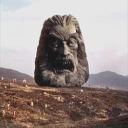Yahoo Answers is shutting down on May 4th, 2021 (Eastern Time) and beginning April 20th, 2021 (Eastern Time) the Yahoo Answers website will be in read-only mode. There will be no changes to other Yahoo properties or services, or your Yahoo account. You can find more information about the Yahoo Answers shutdown and how to download your data on this help page.
Trending News
The bigger the black hole the less dense it becomes...?..So how?
So how may solar masses would a black hole have to be to become as dense as normal space at 3 atoms per square meter.
.
Do you guys see what I'm getting at..?
7 Answers
- ZardozLv 78 years agoFavorite Answer
The mass of black hole in solar masses is M = 4.3[9]√(1/ϱ) M⊙, where ϱ is the density of the black hole. The density of the interstellar medium is ≈ 3.5[7] atoms/m³, or 2.1[-33] kg/m³. Ergo,
M = 4.3[9]√(1/2.1[-33]) M⊙
M = 4.3[9]√4.8[32] M⊙
M = 4.3[9] • 2.2[16] M⊙
M = 9.5[25] M⊙
The mass of the Universe is on the order of 5[22] M⊙. About 1/2000 that of a black hole universe. The interstellar medium, however, accounts for ≈ 3.6% of the mass of the Universe. So it only makes up 1.8[-3]% of the mass needed for the Universe to be a black whole.
Would someone please explain to me why anyone would call a mathematical point a black hole? "Black hole" is a description of appearance. If something has zero size it can't be seen. It is the effect of the singularity that would appear as a black hole; the volume within the event horizon.
Edit: The Newtonian, static black hole, an imaginary entity, is the equivalent of "ignoring air resistance" in the piano falls from the top of the Empire State Building questions. If the questioner is an admirer of entrenching pseudo-pedantry he'll be sure skip me for best answer.
Edit: With apologies, my density value of 2.1[-33] seems wrong but I don't have time to work it out right now.
.
Source(s): [n] = 10ⁿ - grayureLv 78 years ago
A black hole considered as a singularity is always infinitely dense. Considered in terms of the volume inside its event horizon, its density is rather imponderable because density is mass per volume and the volume of a sphere whose centre is the location of the singularity and whose surface is the event horizon is not the same as the size of the black hole due to the curvature of space. Therefore, in a sense a black hole has no meaningful density but something for which there is no word as far as i know. The difference between density and this property is similar to the difference between pressure and density.
- 8 years ago
Interestingly enough, the radius of a black hole with the mass of the Universe works out to be about the current size of the Universe.
Of course with the recent discovery that the Universe is in fact accelerating in its expansion its looking less and less likely that we live in a black hole. In fact, if anything, the Universe bears a similarity to a white hole instead.
Source(s): Science. - RichardLv 78 years ago
Your statement about the sizes of black holes is unfortunately plain wrong. A black hole is a mathematical point - a singularity. It has, therefore, zero volume, regardless of its mass. That is what makes it so extraordinary, and gives it its very peculiar properties. Don't confuse the black hole itself with its event horizon, which is not at all the same thing.
- How do you think about the answers? You can sign in to vote the answer.
- Anonymous8 years ago
Your first sentence seems to be a statement that your question is based upon.
Why don't you supply the name of the Physicist / Cosmologist who said that?
Because that simply is false.
- 8 years ago
Your opening premise is flawed. A black hole has no volume and therefore infinite density.






